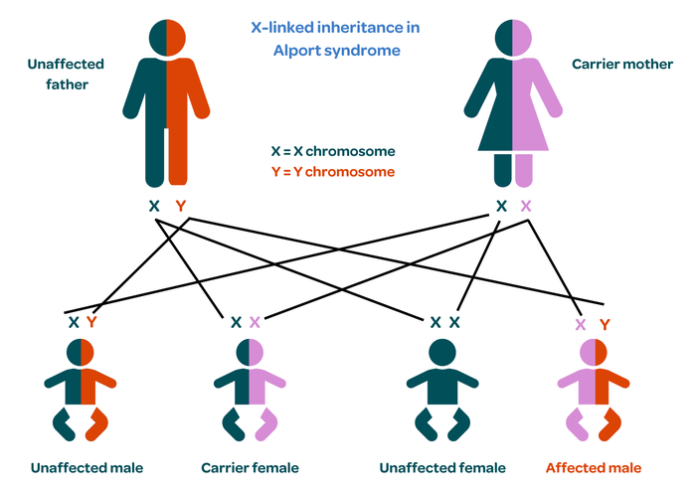Alport syndrome is a genetic disorder characterized by progressive kidney disease, hearing loss, and eye abnormalities. It primarily affects the basement membranes of the kidneys, ears, and eyes. The severity and age of onset can vary depending on the specific genetic mutation.
Symptoms
The symptoms of Alport syndrome can vary but generally include:
- Kidney-related symptoms:
- Hematuria (blood in the urine), often the first sign
- Proteinuria (protein in the urine)
- Progressive loss of kidney function, leading to end-stage renal disease (ESRD)
- Hearing-related symptoms:
- Hearing loss, typically affecting high-frequency sounds and usually begins in late childhood or early adolescence
- Eye-related symptoms:
- Anterior lenticonus (cone-shaped lens)
- Retinal flecks (yellow or white spots in the retina)
- Other abnormalities like corneal erosion
Causes
Alport syndrome is caused by mutations in the genes that encode for type IV collagen, a crucial protein for the structural integrity of basement membranes. The main genes involved are:
- COL4A5: Most common, causing X-linked Alport syndrome (XLAS)
- COL4A3 and COL4A4: These mutations cause autosomal recessive (ARAS) and autosomal dominant Alport syndrome (ADAS)
Treatment
There is no cure for Alport syndrome, but treatment focuses on managing symptoms and slowing the progression of the disease:
- Kidney management:
- Medications such as ACE inhibitors or ARBs to control blood pressure and reduce proteinuria
- Dialysis or kidney transplant in cases of ESRD
- Hearing management:
- Regular hearing assessments
- Hearing aids or cochlear implants if necessary
- Eye management:
- Regular eye exams
- Corrective lenses or surgery for lens abnormalities
- General management:
- Genetic counseling for affected individuals and their families
Prevention
Since it is a genetic condition, there is no known way to prevent it. However, genetic counseling can help at-risk individuals understand their chances of passing the condition to their offspring and discuss potential reproductive options.
Early detection and management of symptoms can help improve the quality of life and slow the progression of the disease.
































